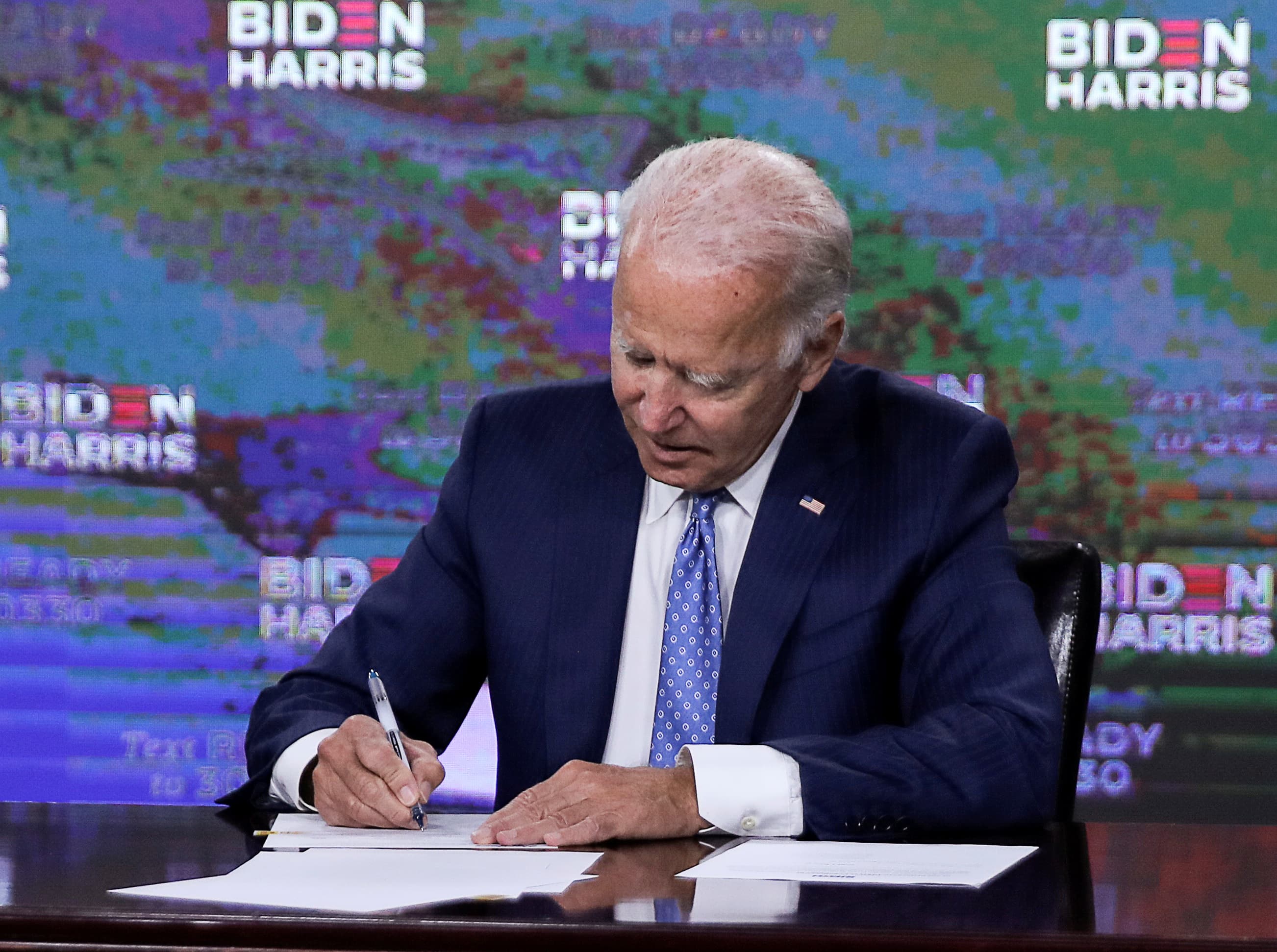Big Tech’s ‘danger scenario’ is a Democratic sweep in November, says investor Bradley Tusk

Democratic presidential candidate Joe Biden signs official documents needed to receive his party’s official nomination next week during an event in Wilmington, Delaware, U.S., August 14, 2020.
Carlos Barria | Reuters
Big Tech stocks are holding up fine despite the threat of increased regulation from U.S. lawmakers. But political strategist and venture capitalist Bradley Tusk says investors are overlooking the risk of a Democratic sweep in November.
Tusk, who worked for Sen. Chuck Schumer, D-N.Y., and served as Mike Bloomberg’s campaign manger in the 2009 New York City mayoral race, sent a memo on Monday to his venture firm’s 30 portfolio companies and 20 consulting clients, explaining how the results of the next week’s election could affect the tech industry.
In an interview with CNBC about the memo, Tusk said the largest tech companies face real risks should Joe Biden win the presidency, particularly if Democrats take back the Senate and hold the House. According to FiveThirtyEight, Democrats are favored to win control of all three, a result that could remove much of the gridlock that’s paralyzed Washington, and pave the way for new legislation.
Investors don’t appear too concerned. They continue to favor shares of Alphabet, Amazon, Apple, Facebook and Microsoft even with the polls moving further in Democrats’ favor. All five stocks are way ahead of the S&P 500 this year, and only Amazon trails the index over the past month.
Big Tech in 2020
CNBC
“People assume Congress is so incompetent and so inept and Big Tech companies are so smart they’ll figure out how to stop them,” said Tusk, who launched Tusk Ventures in 2015. “I don’t know if that’s the correct assumption. You could certainly see left-leaning anti-tech proposals have much more of an impact in Washington starting next year.”
Tusk wrote in the letter that Biden is “clearly the candidate for Silicon Valley.” He said companies will welcome the stability after four years of chaos in the Trump administration and benefit from the lifting of immigration restrictions.
The downside they face is that a Justice Department run by Democrats could put greater pressure on Big Tech, most notably Google, in pursuing antitrust cases.
But the real focus should be on the Senate, Tusk wrote, where a flip to Democrats represents “the danger scenario.” Sens. Bernie Sanders of Vermont and Elizabeth Warren of Massachusetts have been among the loudest voices calling for the breakup of the tech giants.
In addition to antitrust issues, Tusk predicts Democrats would likely enact laws around internet privacy, similar to Europe’s General Data Protection Regulation (GDPR), and repeal Section 230 of the Communications Decency Act, which protects platforms like Facebook and Twitter from liability for their users’ posts.
While Democrats are certain not to hold a filibuster-proof majority requiring 60 seats, a number of Republican senators, like Josh Hawley of Missouri and Ted Cruz of Texas, have been loud tech critics, claiming of late that social media companies are unfairly censoring conservative voices.
In other words, taking on tech may be the rare bipartisan issue.
“Republicans are pretty uniformly convinced that Facebook is out to get them,” Tusk told CNBC.
Good for smaller companies
The story is very different for start-ups, which could benefit from regulatory action, Tusk wrote in the memo. Only the biggest companies are being targeted by lawmakers and state attorneys general for anti-competitive behavior, meaning the market could open up for smaller players.
“For new tech companies, Congressional action could mean opportunity to compete, to innovate, to build products and services without immediately being squashed by one of the giants,” Tusk wrote. “So while a Democratic Senate is unquestionably bad for big tech, it’s not necessarily bad for tech overall.”
Further down ballot, the most significant issue Tusk highlighted was California’s Proposition 22, which, if successful, would exempt app-based ride and delivery services from the state’s new labor law that requires gig economy companies to classify their drivers as employees.
Uber and Lyft are among the major funders of Prop 22 and have said that complying with the existing law would force them to temporarily suspend service in California, where they’re based alongside food delivery companies DoorDash and Instacart.
Tusk wrote that a ballot box victory in California would help Uber and Lyft elsewhere, making it “easier for states like Illinois or Colorado to pass similar legislation, which could start a national trend favorable to on-demand providers.”
Tusk, who previously advised Uber on political matters, said a loss would put the companies on “the defensive nationally” and likely result in them continuing to fight for a legislative victory in California.
Tusk said he wrote the memo because of what happened four years ago, when people were caught off-guard by Trump’s surprise victory. On election night of 2016, Tusk said he rushed out a note to executives in his network, with details about what a Trump administration would mean for various sectors. Based on the feedback, Tusk opted to take a more preemptive approach this time.
He also said politics have become much more pervasive in our lives and that it’s more clear now that ever that companies can’t ignore the consequences of elections.
Here’s how he concluded the memo:
“If companies thought they could escape politics before, they’re in for a rude awakening. Don’t be caught off guard – if 2020 has been any indication, anything can happen.”
WATCH: Big Tech on deck to report, but the Chartmaster says take caution on the results